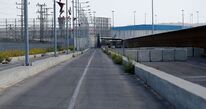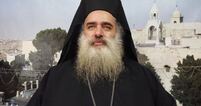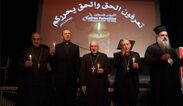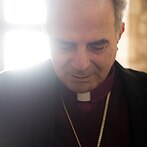14 dec 2019

The Islamic Christian Authority for Patronizing Jerusalem and holy sites has strongly denounced the Israeli occupation authority (IOA) for banning Palestinian Christian citizens in the Gaza Strip from visiting their holy sites in Jerusalem, the West Bank and the 1948 occupied lands.
Hanna Issa, secretary-general of the authority, said in a statement on Saturday that such Israeli measure against Gaza Christians constitutes a grave violation of the freedoms of movement and worship enshrined in the 1948 Universal Declaration of Human Rights.
Issa also said that such Israeli practices violate the Fourth Geneva Convention on the protection of civilian persons and the first protocol attached to the Geneva Conventions with regard to freedom of worship.
He stressed that Israel, as an occupying power, must facilitate the access of worshipers to their holy sites in compliance with the international law.
“We, as Palestinian Christians, affirm our right to practice our acts of worship like other peoples who perform their religious rituals freely, pursuant to the 1948 Universal Declaration of Human Rights,” the Palestinian official said.
Last Thursday, the Israeli occupation authority said Christians in Gaza would not be allowed to visit holy cities such as Bethlehem and Jerusalem to celebrate Christmas this year.
Hanna Issa, secretary-general of the authority, said in a statement on Saturday that such Israeli measure against Gaza Christians constitutes a grave violation of the freedoms of movement and worship enshrined in the 1948 Universal Declaration of Human Rights.
Issa also said that such Israeli practices violate the Fourth Geneva Convention on the protection of civilian persons and the first protocol attached to the Geneva Conventions with regard to freedom of worship.
He stressed that Israel, as an occupying power, must facilitate the access of worshipers to their holy sites in compliance with the international law.
“We, as Palestinian Christians, affirm our right to practice our acts of worship like other peoples who perform their religious rituals freely, pursuant to the 1948 Universal Declaration of Human Rights,” the Palestinian official said.
Last Thursday, the Israeli occupation authority said Christians in Gaza would not be allowed to visit holy cities such as Bethlehem and Jerusalem to celebrate Christmas this year.
13 dec 2019

The Gaza Strip Christians have been banned by the Israeli occupation authorities from visiting holy cities like Bethlehem and Jerusalem to celebrate Christmas this year.
A spokeswoman for Israel's military liaison has said that Gazan Christians are allowed to have permits to travel abroad but none will be allowed to go to the 1948 occupied territories or the West Bank.
The spokeswoman added that based on "security orders" Gazans would be allowed to travel abroad through Allenby (King Husein Bridge) with Jordan but not to visit cities in the 1948 occupied territories or the West Bank. video
The case last year was different as Israel issued permits for about 700 Gazan Christians to travel to Jerusalem, Bethlehem, Nazareth and other holy cities that draw thousands of pilgrims each holiday season.
A spokeswoman for Israel's military liaison has said that Gazan Christians are allowed to have permits to travel abroad but none will be allowed to go to the 1948 occupied territories or the West Bank.
The spokeswoman added that based on "security orders" Gazans would be allowed to travel abroad through Allenby (King Husein Bridge) with Jordan but not to visit cities in the 1948 occupied territories or the West Bank. video
The case last year was different as Israel issued permits for about 700 Gazan Christians to travel to Jerusalem, Bethlehem, Nazareth and other holy cities that draw thousands of pilgrims each holiday season.
12 dec 2019

Father Atallah Hanna has condemned the Israeli decision to build a new settler neighborhood in al-Khalil, describing it as “an attack on the city and its people.”
In press remarks, Hanna, the Archbishop of the Palestinian Orthodox Church in Occupied Jerusalem, expressed his solidarity with al-Khalil residents following the Israeli decision to demolish the wholesale market in the Old City and build housing units for settlers in its place.
He warned that such step would eliminate all hopes of reopening al-Shuhada Street (the wholesale market), which has been closed since the Ibrahimi Mosque massacre.
In press remarks, Hanna, the Archbishop of the Palestinian Orthodox Church in Occupied Jerusalem, expressed his solidarity with al-Khalil residents following the Israeli decision to demolish the wholesale market in the Old City and build housing units for settlers in its place.
He warned that such step would eliminate all hopes of reopening al-Shuhada Street (the wholesale market), which has been closed since the Ibrahimi Mosque massacre.
23 nov 2019

Kairos Palestine expresses deep disappointment that U.S. Secretary of State Mike Pompeo has announced—in a statement that disregards the Geneva Conventions, international law and widespread global consensus—a radical departure from U.S. policy regarding the illegal colonial activities of the State of Israel.
In asserting that the United States will no longer deem West Bank settlements, including those in East Jerusalem, to be “inconsistent with international law,” Secretary of State Pompeo contravenes a 1978 legal opinion by the State Department—upheld with bipartisan support of former administrations—which determined that “while Israel may undertake, in the occupied territories, actions necessary to meet its military needs and to provide for orderly government during the occupation, for reasons indicated above the establishment of the civilian settlements in those territories is inconsistent with international law.”
Secretary Pompeo went on to announce that this move by the United States should not be viewed as the U.S. “prejudging the ultimate status of the West Bank.” Recent actions by the Trump administration belie this statement.
These actions include moving the U.S. embassy to Jerusalem, defunding the UNRWA, shuttering the Palestinians’ office in Washington, D.C., attempts to redefine who may be considered a Palestinian refugee, and embracing Israeli Prime Minister Netanyahu’s annexation plans.
All these moves, including what to date has been revealed of the Middle East peace plan put forward by Trump’s son-in-law and advisor Jared Kushner, have to be interpreted as U.S. attempts to force the capitulation of Palestinians to the will of the State of Israel.
Kairos further stated, according to the PNN:
In our holy text, the story is told of King Ahab coveting the vineyard of Naboth the Jezreelite (1 Kings 21). When Naboth refuses the king’s offer to purchase the land which Naboth describes as his “ancestral inheritance”, a plot is launched in the king’s household to take the land by force. A false charge is made against Naboth, which leads to his being stoned to death, after which King Ahab sets out to take possession of Naboth’s vineyard.
In the same way that the Lord instructed the Prophet Elijah to intervene and confront the king, Kairos Palestine asks its partners—people of faith and those of good will—to call on leaders of the U.S. government to reexamine its failed role as a facilitator of peace between Israel and Palestinians.
Secretary of State Pompeo and the government of the United States must understand that God’s community of justice, peace and provision for all—coming on earth as it is in heaven—may be delayed but will not be denied. As stated in the document, Kairos Palestine: A Moment of Truth, “In the absence of all hope, we cry out our cry of hope.
We believe in God, good and just. We believe that God’s goodness will finally triumph over the evil and hate and of death that still persist in our land. We will see here ‘a new land’ and ‘a new human being’, capable of rising up in the spirit to love each one of his or her brothers and sisters.
In asserting that the United States will no longer deem West Bank settlements, including those in East Jerusalem, to be “inconsistent with international law,” Secretary of State Pompeo contravenes a 1978 legal opinion by the State Department—upheld with bipartisan support of former administrations—which determined that “while Israel may undertake, in the occupied territories, actions necessary to meet its military needs and to provide for orderly government during the occupation, for reasons indicated above the establishment of the civilian settlements in those territories is inconsistent with international law.”
Secretary Pompeo went on to announce that this move by the United States should not be viewed as the U.S. “prejudging the ultimate status of the West Bank.” Recent actions by the Trump administration belie this statement.
These actions include moving the U.S. embassy to Jerusalem, defunding the UNRWA, shuttering the Palestinians’ office in Washington, D.C., attempts to redefine who may be considered a Palestinian refugee, and embracing Israeli Prime Minister Netanyahu’s annexation plans.
All these moves, including what to date has been revealed of the Middle East peace plan put forward by Trump’s son-in-law and advisor Jared Kushner, have to be interpreted as U.S. attempts to force the capitulation of Palestinians to the will of the State of Israel.
Kairos further stated, according to the PNN:
In our holy text, the story is told of King Ahab coveting the vineyard of Naboth the Jezreelite (1 Kings 21). When Naboth refuses the king’s offer to purchase the land which Naboth describes as his “ancestral inheritance”, a plot is launched in the king’s household to take the land by force. A false charge is made against Naboth, which leads to his being stoned to death, after which King Ahab sets out to take possession of Naboth’s vineyard.
In the same way that the Lord instructed the Prophet Elijah to intervene and confront the king, Kairos Palestine asks its partners—people of faith and those of good will—to call on leaders of the U.S. government to reexamine its failed role as a facilitator of peace between Israel and Palestinians.
Secretary of State Pompeo and the government of the United States must understand that God’s community of justice, peace and provision for all—coming on earth as it is in heaven—may be delayed but will not be denied. As stated in the document, Kairos Palestine: A Moment of Truth, “In the absence of all hope, we cry out our cry of hope.
We believe in God, good and just. We believe that God’s goodness will finally triumph over the evil and hate and of death that still persist in our land. We will see here ‘a new land’ and ‘a new human being’, capable of rising up in the spirit to love each one of his or her brothers and sisters.
22 nov 2019

The Evangelical Lutheran Church in Jordan and the Holy Land (ELCJHL) has expressed deep concern over the recent U.S. declaration which recognized “the legitimacy” of the illegal Israeli colonial settlements in the occupied West Bank, The Palestinian News and Info Agency (WAFA) reported.
“The Evangelical Lutheran Church in Jordan and the Holy Land is deeply concerned with the United States Administration’s recent announcement, reversing its position on the building of settlements on Palestinian land,” said Bishop Sani Ibrahim Azar in a press statement.
“This reversal of a long-held commitment and understanding is in opposition to international law and consensus,” added Azar, and cautioned that “this change in U.S. policy endangers future negotiations toward a two-state solution and a Jerusalem shared by the three Abrahamic faiths.”
ELCJHL expressed worries that “a U.S. declaration in support of Israeli settlements will lead to more expansion into already dwindling Palestinian territory, further displacing Palestinians.”
“As people of faith in a God of justice, peace, and equality, we must protect the rights and humanity of all people. As Palestinian Christians, we continue to stand steadfast in this land, strengthened by the hope we have through Jesus Christ,” the statement added.
Azar concluded by expressing his gratitude for the partnership and statements of churches, mosques and synagogues around the world who stand in solidarity with the Palestinian people during this time of great disappointment and uncertainty.
On Tuesday, the U.S. Secretary of State, Mike Pompeo announced that Israeli colonial settlements in the internationally recognized Israeli-occupied West Bank, are not inconsistent with international law, throwing out a 1978 State Department legal opinion that stated that Israeli settlements violate international law.
“The Evangelical Lutheran Church in Jordan and the Holy Land is deeply concerned with the United States Administration’s recent announcement, reversing its position on the building of settlements on Palestinian land,” said Bishop Sani Ibrahim Azar in a press statement.
“This reversal of a long-held commitment and understanding is in opposition to international law and consensus,” added Azar, and cautioned that “this change in U.S. policy endangers future negotiations toward a two-state solution and a Jerusalem shared by the three Abrahamic faiths.”
ELCJHL expressed worries that “a U.S. declaration in support of Israeli settlements will lead to more expansion into already dwindling Palestinian territory, further displacing Palestinians.”
“As people of faith in a God of justice, peace, and equality, we must protect the rights and humanity of all people. As Palestinian Christians, we continue to stand steadfast in this land, strengthened by the hope we have through Jesus Christ,” the statement added.
Azar concluded by expressing his gratitude for the partnership and statements of churches, mosques and synagogues around the world who stand in solidarity with the Palestinian people during this time of great disappointment and uncertainty.
On Tuesday, the U.S. Secretary of State, Mike Pompeo announced that Israeli colonial settlements in the internationally recognized Israeli-occupied West Bank, are not inconsistent with international law, throwing out a 1978 State Department legal opinion that stated that Israeli settlements violate international law.
20 nov 2019

Pope Francis with President Rivlin
The Roman Catholic Church says it supports the right of Israel to live in peace and security but the decision by the Trump administration to back Jewish settlements in the West Bank 'undermines regional stability'
The Vatican said on Thursday the search for peace between Israelis and Palestinians had been put at risk after the United States backed Israel's building of settlements in the West Bank.
Secretary of State Mike Pompeo announced Monday that the U.S. is softening its position on Israeli settlements in the West Bank and parts of East Jerusalem, the latest in a series of Trump administration moves that weaken Palestinian claims to statehood.
"In the context of recent decisions that risk undermining further the Israeli-Palestinian peace process and the already fragile regional stability, the Holy See reiterates its position of a two-state solution for two peoples, as the only way to reach a complete solution to this age-old conflict," the Vatican said in a statement.
"The Holy See supports the right of the State of Israel to live in peace and security within the borders recognized by the international community and supports the same right that belongs to the Palestinian people, which must be recognized, respected and implemented," it added.
Pompeo repudiated a 1978 State Department legal opinion that held that civilian settlements in the occupied territories are “inconsistent with international law.” The move angered Palestinians and immediately put the U.S. at odds with other nations working to end the conflict.
"Israel’s legal system, which has proven itself fully capable of addressing legal questions related to the settlements, is the appropriate place for these matters to be adjudicated - not biased international forums that pay no attention to history or facts," Prime Minister Benjamin Netanyahu said after the decision.
The Roman Catholic Church says it supports the right of Israel to live in peace and security but the decision by the Trump administration to back Jewish settlements in the West Bank 'undermines regional stability'
The Vatican said on Thursday the search for peace between Israelis and Palestinians had been put at risk after the United States backed Israel's building of settlements in the West Bank.
Secretary of State Mike Pompeo announced Monday that the U.S. is softening its position on Israeli settlements in the West Bank and parts of East Jerusalem, the latest in a series of Trump administration moves that weaken Palestinian claims to statehood.
"In the context of recent decisions that risk undermining further the Israeli-Palestinian peace process and the already fragile regional stability, the Holy See reiterates its position of a two-state solution for two peoples, as the only way to reach a complete solution to this age-old conflict," the Vatican said in a statement.
"The Holy See supports the right of the State of Israel to live in peace and security within the borders recognized by the international community and supports the same right that belongs to the Palestinian people, which must be recognized, respected and implemented," it added.
Pompeo repudiated a 1978 State Department legal opinion that held that civilian settlements in the occupied territories are “inconsistent with international law.” The move angered Palestinians and immediately put the U.S. at odds with other nations working to end the conflict.
"Israel’s legal system, which has proven itself fully capable of addressing legal questions related to the settlements, is the appropriate place for these matters to be adjudicated - not biased international forums that pay no attention to history or facts," Prime Minister Benjamin Netanyahu said after the decision.
